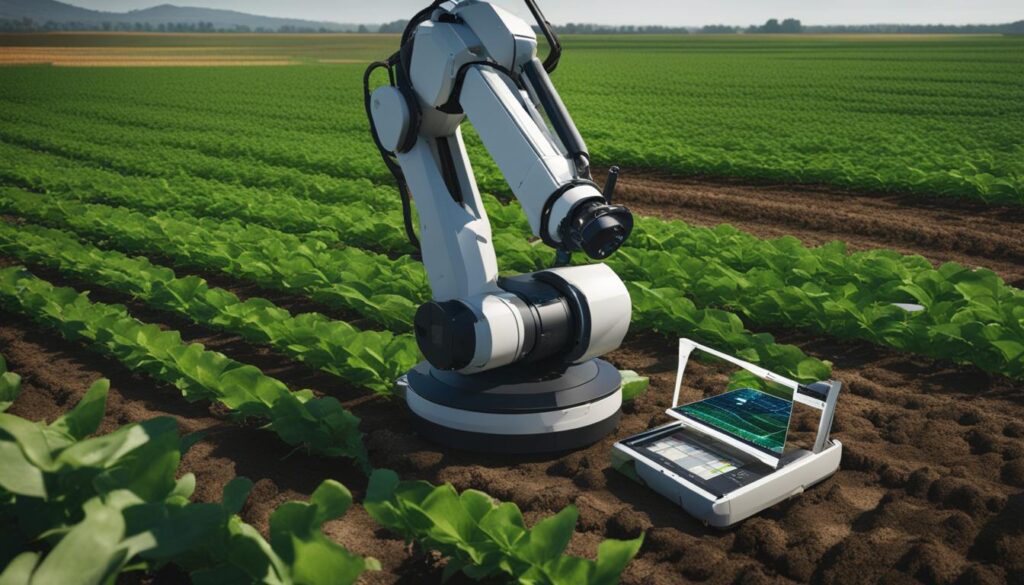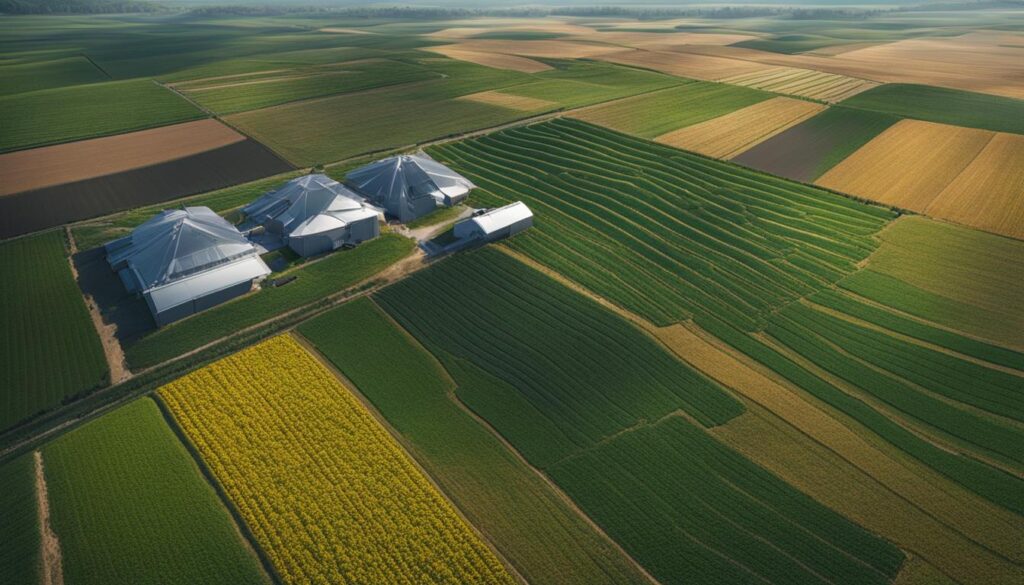Are you interested in growing your own food? The practice of home gardening has become increasingly popular as people seek more sustainable practices. But did you know that with the integration of AI technology, you can optimize your home gardening and sustainable farming practices for better outcomes? Let’s explore how AI is revolutionizing various aspects of sustainable farming, from crop health monitoring to pest control strategies and seasonal planting guides.
Overall, AI technology offers valuable solutions for sustainable farming practices. Through AI-powered crop monitoring, soil analysis, and water management, farmers can optimize their farming practices, enhance crop health, and minimize environmental impacts. By leveraging AI applications in farming, we can create a more sustainable and eco-friendly agricultural sector that ensures food security for future generations.
| AI Sustainable Farming Practices | Benefits |
|---|---|
| AI-powered crop monitoring | Early detection of pest infestations and diseases, targeted interventions for crop health |
| AI soil analysis and nutrient management | Accurate insights into soil composition, personalized fertilizer recommendations |
| AI-driven water management | Efficient utilization of water resources, optimal crop growth |
Advanced AI Applications in Pest Management and Control
AI in Detecting Early Signs of Pest Infestations
AI technology offers advanced applications in pest management and control, revolutionizing how farmers tackle pest infestations while minimizing environmental impact. AI algorithms can analyze data from sensors, drones, and cameras to detect early signs of pest infestations. This early detection allows farmers to implement targeted interventions, reducing the need for broad-spectrum pesticides.
By leveraging AI in pest management, farmers can protect their crops while preserving biodiversity and minimizing the use of harmful chemicals.
Deploying AI Strategies for Eco-friendly Pest Control Solutions
AI technology offers innovative solutions for eco-friendly pest control. By analyzing pest behavior patterns, environmental factors, and crop health data, AI algorithms can develop targeted pest control strategies. These strategies may include the use of natural predators, pheromone-based traps, or biopesticides that specifically target pests while minimizing harm to beneficial insects and the environment.
AI also enables real-time monitoring of pest populations and provides recommendations for intervention, helping farmers implement eco-friendly pest control methods that promote sustainable farming practices.

| Advantages of AI in Pest Management | Benefits of Eco-friendly Pest Control |
|---|---|
| Early detection of pest infestations | Reduced use of broad-spectrum pesticides |
| Targeted interventions for effective pest control | Preservation of biodiversity |
| Real-time monitoring of pest populations | Minimized harm to beneficial insects |
| Development of sustainable pest control strategies | Reduced environmental impact |
AI-Driven Seasonal Planting Guides and Predictive Analytics
AI technology is revolutionizing farming practices by providing farmers with valuable insights and predictive capabilities for optimized crop yields. AI-driven seasonal planting guides and predictive analytics enable farmers to make informed decisions regarding planting schedules and yield predictions, leading to sustainable and efficient farming practices.
Customizing planting schedules with machine learning allows farmers to tailor their planting routines based on climate, soil conditions, and crop-specific requirements. By analyzing historical data and real-time environmental factors, AI algorithms generate personalized planting recommendations that maximize yield potential and resource utilization.
To improve yield predictions, AI-based weather analysis analyzes historical weather data and current weather patterns. By identifying correlations between weather conditions and crop performance, farmers can make strategic decisions regarding planting, harvesting, and market planning. AI-driven yield forecasting minimizes crop losses and optimizes resource allocation for sustainable and efficient crop production.
Incorporating AI-driven planting guides and predictive analytics empowers farmers to optimize their farming practices and achieve sustainable outcomes in the agricultural sector.
Customizing Planting Schedules with Machine Learning
Machine learning algorithms analyze historical data and real-time environmental factors to customize planting schedules for farmers. By incorporating climate, soil conditions, and crop-specific requirements, AI-generated planting recommendations optimize yield potential and resource utilization. Continual learning and improvement of machine learning models result in more accurate planting schedules over time, enabling farmers to maximize crop health and productivity while practicing sustainable farming methods.
Improving Yield Predictions Using AI-Based Weather Analysis
AI-based weather analysis enhances yield predictions by analyzing historical weather data and real-time weather patterns. By identifying correlations between weather conditions and crop performance, AI algorithms generate accurate yield forecasts for different crops and regions. These predictions help farmers make informed decisions regarding planting, harvesting, and market planning, optimizing resource allocation and minimizing crop losses. AI-driven yield forecasting enables farmers to adapt their farming practices, implement risk management strategies, and achieve sustainable and efficient crop production.
AI-Driven Seasonal Planting Guides and Predictive Analytics
| Benefits | AI Applications | Examples |
|---|---|---|
| Customized planting schedules | Machine learning algorithms | Analyzing climate, soil conditions, and crop-specific requirements to optimize planting schedules for maximum yield potential |
| Accurate yield predictions | AI-based weather analysis | Analyzing historical weather data and real-time weather patterns to generate yield forecasts for different crops and regions |
| Informed decision-making | Predictive analytics | Providing farmers with insights for strategic decisions regarding planting, harvesting, and market planning |
Exploring Sustainable Farming Apps and AI Technology
Navigating the Use of Farming Apps to Enhance Growing Practices
The integration of sustainable farming apps and AI technology provides a wide range of tools to enhance growing practices and streamline farm management. These apps offer valuable information on weather forecasts, pest outbreaks, and crop recommendations, allowing farmers to make data-driven decisions. By incorporating AI technology, these apps provide real-time data analysis, personalized insights, and predictive capabilities. From soil analysis to irrigation management, AI-driven farm management tools optimize resource utilization, enhance productivity, and promote sustainable farming practices.
Sustainable farming apps equipped with AI-driven tools offer practical solutions for improving growing practices. These apps feature soil analysis, weather forecasting, pest monitoring, and crop health tracking functionalities. Leveraging AI technology, these apps provide personalized recommendations for irrigation, fertilization, and pest control, enabling farmers to optimize their practices for better sustainability and resource management. By navigating the use of farming apps, farmers can access valuable insights, improve productivity, and drive the adoption of eco-friendly agricultural practices.
Incorporating AI Tools for Real-Time Farm Management
AI tools for real-time farm management revolutionize agricultural operations by providing accurate data analysis, actionable insights, and resource optimization solutions. These tools monitor essential factors such as soil moisture, weather conditions, and crop health, allowing farmers to make informed decisions and take proactive actions. AI algorithms analyze data in real-time, enabling farming practices that maximize resource utilization, minimize environmental impact, and improve productivity. By incorporating AI tools for real-time farm management, farmers can enhance their operations, achieve sustainable outcomes, and contribute to a greener future.
Examining the Economic and Environmental Impacts of AI in Agriculture
Examining the economic and environmental impacts of AI in agriculture helps us understand the value and benefits of integrating AI technology. Assessing the cost-benefit analysis of AI agricultural investments provides insights into the economic advantages, such as increased productivity, reduced input costs, and improved resource management. Furthermore, AI plays a vital role in reducing the carbon footprint of farming operations by enabling efficient resource utilization, minimizing waste, and promoting eco-friendly practices. Understanding the economic and environmental impacts of AI in agriculture is crucial for driving adoption and realizing the full potential of sustainable farming with AI.
Assessing the Cost-Benefit Analysis of AI Agricultural Investments
Assessing the cost-benefit analysis of AI agricultural investments is essential to understand the economic advantages of integrating AI technology. AI-driven solutions can enhance productivity, reduce input costs, and optimize resource utilization, leading to improved profitability for farmers. By analyzing the upfront costs of implementing AI technology and comparing them to the long-term benefits and savings, farmers can make informed investment decisions. Cost-benefit analysis provides insights into the economic viability of AI agricultural investments, helping farmers realize the potential returns and advantages of sustainable farming practices with AI.
AI’s Role in Reducing the Carbon Footprint of Farming Operations
AI technology plays a crucial role in reducing the carbon footprint of farming operations. By enabling efficient resource utilization, AI helps farmers optimize water usage, minimize chemical input, and maximize yield potential. AI-driven solutions also promote eco-friendly practices, such as targeted pest control, precision irrigation, and optimized fertilization. These practices reduce waste, minimize environmental impact, and contribute to a more sustainable and greener agricultural sector. AI’s role in reducing the carbon footprint of farming operations is essential for achieving sustainable farming practices and mitigating the impacts of agriculture on climate change.
The economic and environmental impacts of AI in agriculture are significant. Through cost-efficiency, enhanced resource management, and reduced carbon footprint, AI technology enables sustainable and eco-friendly farming practices. By harnessing the potential of AI in agriculture, farmers can achieve higher productivity, profitability, and environmental stewardship. Embracing AI-driven solutions is key to shaping a more sustainable and resilient future for the agricultural sector.
Conclusion
The integration of AI technology in sustainable farming practices has the potential to revolutionize the agricultural sector. With AI-driven solutions, farmers can enhance crop health, optimize resource utilization, and reduce environmental impact. From home gardening to large-scale farming operations, AI technologies offer valuable insights, personalized recommendations, and predictive capabilities, empowering farmers to make informed decisions and drive sustainable outcomes.
By leveraging AI in agriculture and adopting eco-friendly farming practices, we can build a greener future and ensure food security for generations to come. AI-driven sustainability enables farmers to maximize productivity while minimizing environmental footprints. The future of farming with AI is bright, promising increased sustainability, productivity, and resilience in the agricultural sector.
As we continue to explore and develop AI technologies, we can unlock even more potential for sustainable agriculture. By combining AI-driven solutions with innovative farming methods, we can address the challenges of climate change, resource scarcity, and growing global food demand. Embracing AI in sustainable farming practices is not only beneficial for farmers but also crucial for creating a more sustainable and resilient food system for a brighter future.
